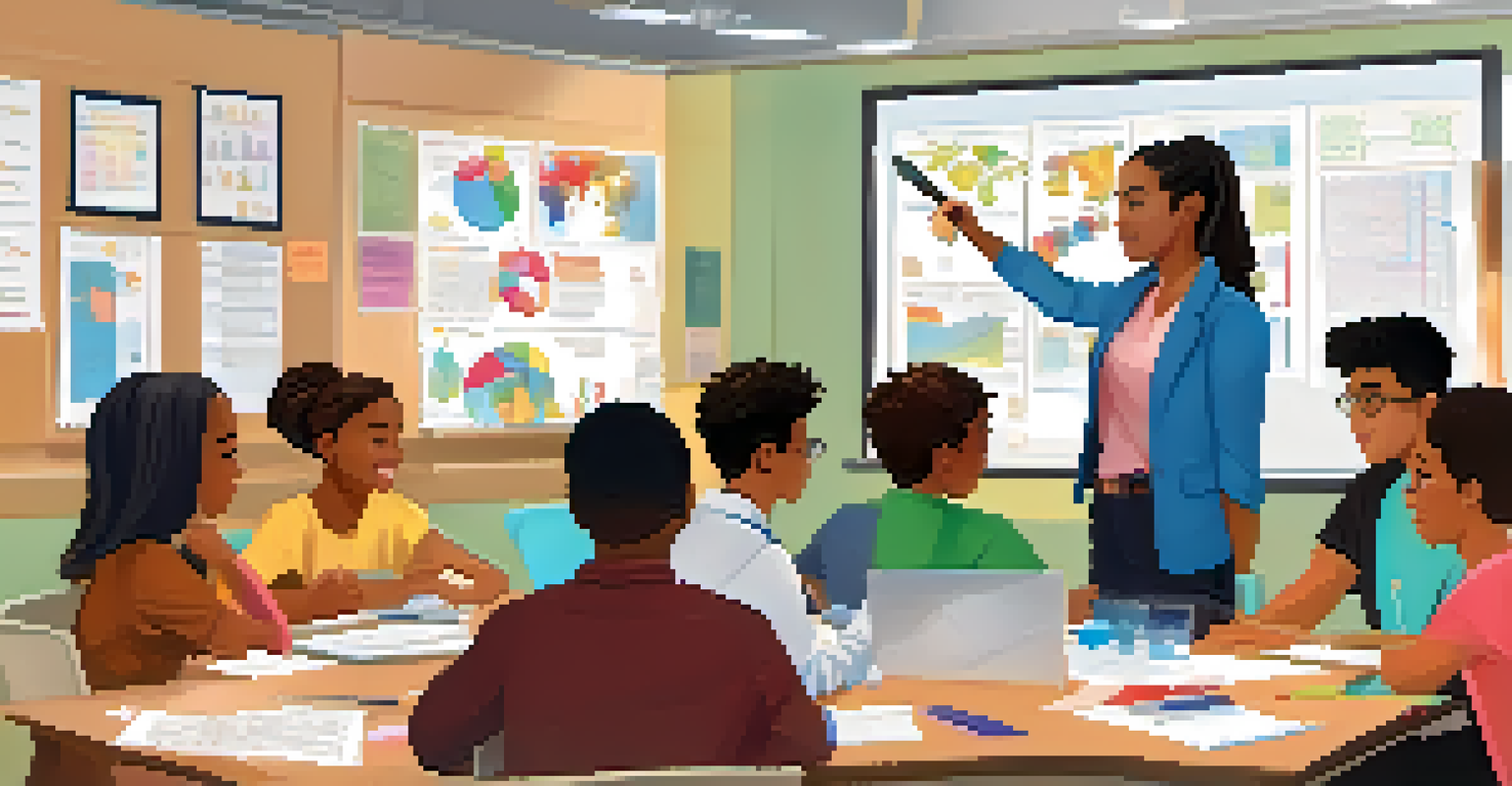The Impact of Self-Regulated Learning on Assessment

What is Self-Regulated Learning and Why It Matters
Self-regulated learning (SRL) refers to the process where students take control of their own learning by setting goals, monitoring their progress, and reflecting on their outcomes. This proactive approach not only enhances their academic performance but also fosters lifelong learning skills. In essence, SRL empowers learners to become active participants in their education rather than passive recipients of information.
The greatest gifts you can give your children are the roots of responsibility and the wings of independence.
The importance of SRL lies in its ability to cultivate independence and responsibility among students. When learners engage in self-regulation, they develop crucial skills like time management and self-motivation, which are essential in both academic settings and beyond. This self-awareness encourages students to identify their strengths and weaknesses, guiding them in tailoring their study strategies effectively.
Furthermore, SRL aligns closely with modern educational practices that emphasize personalized learning. As educators shift towards more student-centered approaches, understanding and promoting self-regulated learning becomes pivotal. This shift helps create a classroom environment where students feel equipped to take charge of their learning journeys.
The Link Between SRL and Assessment Methods
Assessment often serves as a mirror reflecting students' understanding and skills. When self-regulated learning is in play, it can significantly influence how assessments are approached and interpreted. For instance, students who practice SRL are likely to engage with assessments more thoughtfully, as they understand their learning processes and can identify areas needing improvement.

Moreover, assessments that incorporate self-regulated learning strategies, such as self-assessments or peer evaluations, provide richer insights into student performance. These methods not only gauge knowledge but also encourage reflection and critical thinking. By actively engaging in the assessment process, students are more likely to take ownership of their learning outcomes.
Empowering Learners Through SRL
Self-regulated learning enables students to take control of their education by setting goals, monitoring progress, and reflecting on outcomes.
Incorporating SRL into assessments can also lead to more meaningful feedback. When students are involved in evaluating their own work, they are more likely to internalize the feedback received. This creates a positive feedback loop, where students learn from their mistakes and successes, ultimately leading to improved performance in future assessments.
How SRL Enhances Student Motivation and Engagement
One of the most powerful impacts of self-regulated learning is its ability to boost student motivation. When learners are actively involved in setting their goals and tracking their progress, they tend to feel more motivated and engaged in their studies. This intrinsic motivation often translates into a greater willingness to tackle challenging tasks and persist through difficulties.
Learning is a treasure that will follow its owner everywhere.
Engagement is not just about enthusiasm; it's about a deep connection to the learning process. SRL encourages students to reflect on their interests and how they relate to their studies, making the material more relevant and enjoyable. For example, a student interested in environmental science might set a goal to research renewable energy solutions, connecting personal passion with academic objectives.
Furthermore, motivated students are often more resilient. When they encounter setbacks, they are likely to employ self-regulation strategies to overcome challenges, such as seeking help or adjusting their study methods. This resilience not only benefits their academic performance but also equips them with essential life skills.
The Role of Reflection in Self-Regulated Learning
Reflection is a cornerstone of self-regulated learning, allowing students to assess their understanding and strategies. By taking the time to think about what worked and what didn’t, learners can adjust their approaches accordingly. This reflective practice helps students develop a growth mindset, where they view challenges as opportunities for growth rather than insurmountable obstacles.
For example, after completing an assessment, a student might reflect on their preparation methods, identifying which strategies were effective and which weren’t. This kind of reflection fosters a deeper understanding of their learning processes and encourages them to take proactive steps in future studies. It turns assessment from a mere grade into a learning experience.
SRL Boosts Motivation and Resilience
Engaging in self-regulated learning fosters intrinsic motivation and resilience, helping students tackle challenges and persist through difficulties.
Moreover, when reflection is integrated into the assessment process, it promotes a culture of continuous improvement. Students become accustomed to viewing feedback as a tool for growth, rather than just a judgment of their abilities. This shift in perspective can significantly enhance their overall learning outcomes.
Adapting Assessments to Foster Self-Regulated Learning
To effectively integrate self-regulated learning into assessments, educators can adapt their methods to create a more supportive environment. This might include offering flexible assessment formats, such as project-based assessments or portfolios, which allow students to demonstrate their learning in ways that resonate with them. Such adaptations can empower students to take more ownership of their learning.
Additionally, providing opportunities for goal-setting and self-assessment can further enhance SRL. For instance, educators might encourage students to set personal learning goals before an assessment and reflect on their progress afterward. This not only helps students stay focused but also reinforces the habit of self-regulation.
Lastly, training educators on how to facilitate self-regulated learning through assessment is crucial. By equipping teachers with the right tools and strategies, they can more effectively guide students in developing their self-regulation skills. This collaborative effort ultimately leads to a richer educational experience for everyone involved.
Challenges in Implementing SRL in Assessments
While the benefits of self-regulated learning are clear, implementing it within assessments can present challenges. One major hurdle is the varying levels of self-regulation among students. Not all learners come equipped with the skills necessary for effective self-regulation, which can result in inconsistent outcomes across the classroom.
Additionally, educators may face difficulties in designing assessments that truly reflect self-regulated learning practices. Striking the right balance between traditional assessments and those that encourage self-regulation requires thoughtful planning and resources. Teachers must carefully consider how to incorporate SRL without overwhelming students or compromising assessment integrity.
Reflection Enhances Learning Outcomes
Integrating reflection into the learning process allows students to assess their strategies and view feedback as a tool for continuous improvement.
Finally, there may be resistance from both students and educators. Some students may be accustomed to more traditional forms of assessment and reluctant to embrace a new approach. Similarly, educators may feel uncertain about altering their assessment methods. Overcoming these challenges requires ongoing support and open communication among all stakeholders.
Future Directions for SRL and Assessment Practices
Looking ahead, the integration of technology can play a significant role in enhancing self-regulated learning within assessments. Tools like learning management systems and digital portfolios can provide students with platforms to track their progress and reflect on their learning journeys. These technologies not only facilitate self-regulation but also make the assessment process more transparent and accessible.
Additionally, increased emphasis on personalized learning will likely continue to shape assessment practices. As education evolves, the focus on tailoring learning experiences to individual student needs will promote greater adoption of self-regulated learning strategies. This shift can lead to more effective assessments that recognize and honor diverse learning styles.

Ultimately, fostering a culture of self-regulated learning in assessments will require collaboration among educators, students, and parents. By working together to create supportive learning environments, we can better prepare students for academic success and lifelong learning. Emphasizing SRL in assessment practices will contribute to a more engaged, motivated, and resilient generation of learners.